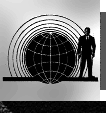He saw her from a distance and recognized the posture of someone who was grieving or upset; he wasn't certain which it was, but she shook from the tears she was trying to subdue. He wanted to approach her, but felt it would be an intrusion into her private seige of discomfiture. He knew how it felt, that sense of being hopeless and alone. He knew that sometimes he might feel as she looked to him now in the throes of whatever pain was propelling her forward.
Just as he had determined to not interrupt the woman, she suddenly stopped and in the same motion that straightened her shoulders and quieted her weeping, her eyes met his in an act of resolution and pride. He recognized that as well.
How many times had he pulled himself up out of a self-inflicted state of depression or anger, only to meet the world around him with an iron willed resolve to overcome every obstacle, and every disappointment that tried to block his way.
When she saw him, her chin lifted a little higher and he nodded to her while a shadow of a smile crept onto his face. She rose up from the bench and turned to walk in the direction of the city, leaving the massive park behind her even as she was relegating whatever sorrow or dispair had brought her here.
He watched her go, wondering momentarily what had brought her to this place and to the torrent of emotion he had witnessed just minutes ago. His own shoulders straightened as he cast off the approaching darkness of his own melancholy; his memories were always near by to the life he now lived. Sometimes, in the night amidst the nightmares and regrets, he could see his past unfolding with the speed that only retrospect could provide. A childhood spent in the mires of German occupation, and the horrors of a wartorn homeland; the loss of innocence as he was subjected to the demands of the state, and the rigors of an education he had earned by his status as "exceptional". That had garnered little that felt exceptional or special, only more work, more handlers and less freedom than even the less fortunate.
As Christmas approached here in this city, the lights were brighter than normal, and the capricious nature of a decadent and truly capitalistic society was more keenly apparent to his Soviet conscience. While children here were making lists in expectation of lavish rewards for nothing more than the good fortune to be born here, he knew that the little ones in his own country would remain ignorant of such things; only the remnants of practices left by the older generations keeping some hint of this celebration in the dark corners of Soviet society. He was torn between a keen distaste for this American excess, and the desire to be a part of it. He wanted to share with his co-workers and, especially his partner and only friend, the wonder he perceived in this season. In spite of the warnings that still lingered in his mind regarding the debauchery associated with such festivities in America, he had seen no evidence of it. To the contrary, people were cheerful and welcoming to him, as much as he allowed them to be. His wariness had driven a few of them away, but still some persisted. Napoleon was trying to share this holiday with him, and had invited him to parties and even to participate in the day itself among his own family.
How to be both Soviet and not Soviet was a perplexing situation. He had no one with whom to engage in his dour Russian ideals of denial and self-imposed misery. So, why did he persist in the effort? Why not just join the party and enjoy the festivities with the others at headquarters and, in fact, in this city? Perhaps it was the gun he always carried in the holster he was so seldom without. Or, maybe the memory of the last man he had killed kept him from wanting to celebrate. His own personal aesthetic regarding life and death kept him at a constant place of inner conflict and gut wrenching shame. Death was not so easily dismissed when it was such an integral part of one's life, and the responsibility he bore for it sometimes consumed him. His cause was just, but the taking of a life still necessitated some kind of remorse, and too often he felt that it escaped him. He had been trained to do things that were unutterable among polite company, let alone society in general. And, what was his reward in these things, aside from the knowledge of stopping an atrocity from a still unspoken menace?
All of these things sped through his mind as he walked through the park and back to a subway entrance. At the top of the steps he halted, the remembrance of a party at headquarters suddenly jolting him out of his melaise. He turned back to the curb and hailed a taxi, certain that this decision could change his life here among these people. There was nothing to be gained by holding onto the old party line. He didn't believe all of it anyway. This was his opportunity, his new life among this very different breed of people. These were the ones who understood what he did, and forgave him without ever asking the details. He might never win a popularity contest, but he had no reason to withdraw from them completely, ignoring their kindness and insulting their customs. He had better breeding than that, regardless of the Soviet disdain for such things.
The taxi dropped him at the entrance to Del Floria's and he entered the building with a new resolve, and an unfamiliar sense of anticipation; he was going to enjoy himself tonight. As he entered the canteen where the party was being held, the decorations and music swept the Russian up into its swirl of chattering people and happy expressions. Napoleon was surrounded by his usual throng of admirers, but when he saw Illya enter the room his jaw nearly dropped to the linoleum beneath him.
"Illya, I didn't think you were coming. Welcome to... well, Merry Christmas". The smile was wrapped around his handsome face as he drew the blond into his circle and watched as the women purred their delight at finally capturing the younger man within arms length. And, he admitted to himself with a little hesitancy, that it felt good to be here. It took much less time to adjust to being happy and content than it had to develop his rancor and discontent. This was effortless, and he intended to make much use of the benefits as he surveyed the room and the sense of newfound freedom.
And, really, that's what this was: He was free now to be happy and to be unhindered by the constraints from which he had travelled. He would deal with the reality of his job, the responsibilities that it entailed. He could do that, and it would be much easier now; he had company within these walls. These people at UNCLE would help him adjust, would back him up when he thought he couldn't go any farther.
This organization...UNCLE...this was his new country.
|
|

